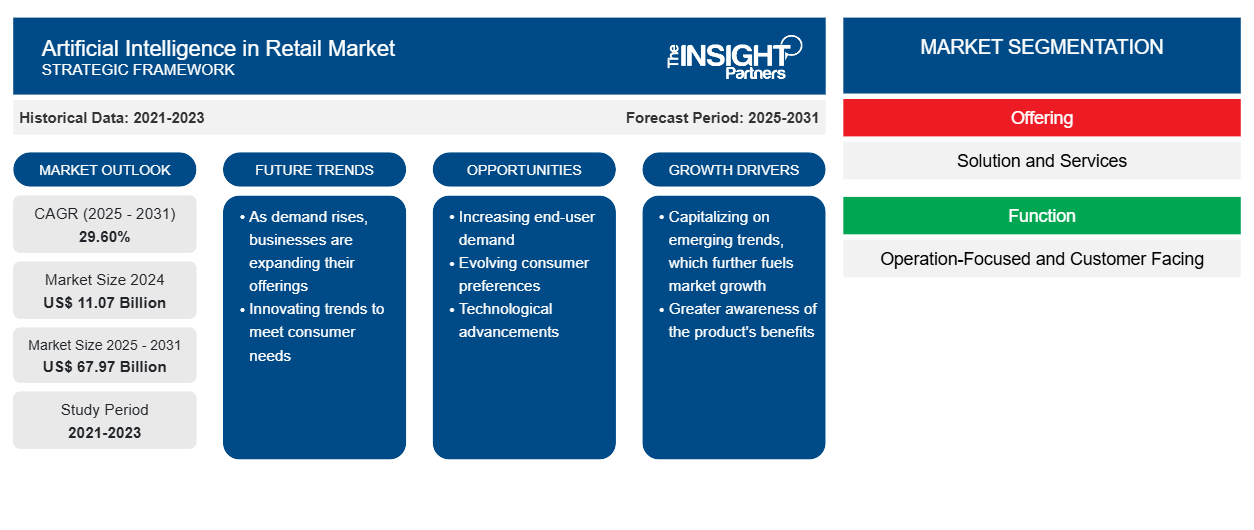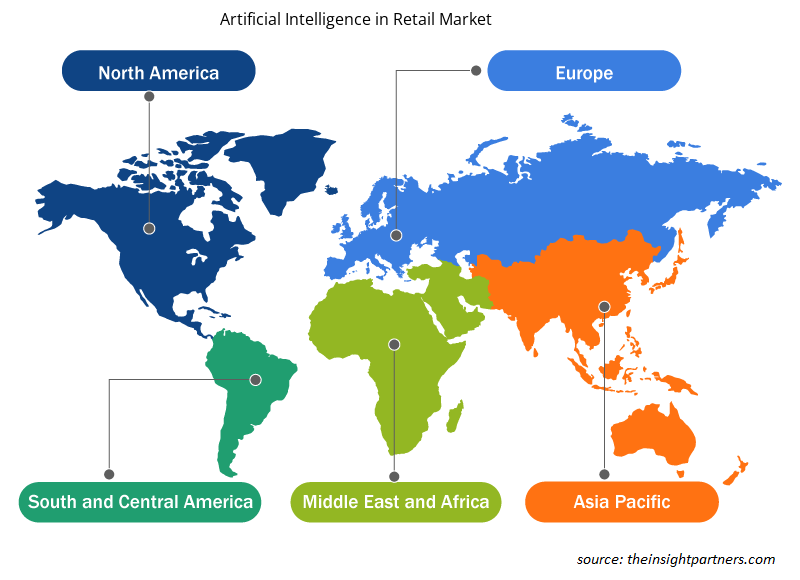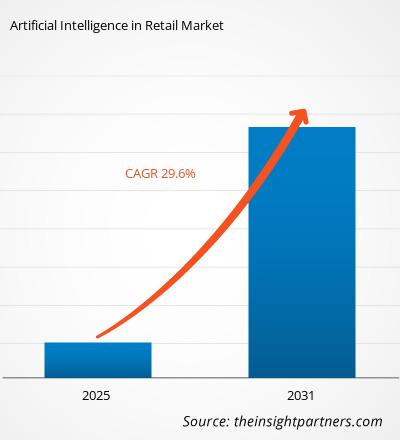[Research Report] The Artificial Intelligence in Retail Market size is expected to grow from US$ 6.59 billion in 2022 to US$ 52.45 billion by 2031; it is estimated to grow at a CAGR of 29.6% from 2022 to 2031.
Analyst Perspective:
The retail industry is changing as a result of artificial intelligence (AI). Retailers may use artificial intelligence (AI) to engage with their customers and run their businesses more effectively, from utilizing computer vision to modify promotions in real time to utilizing machine learning for inventory management. Profit and productivity must be given top priority in retail enterprises if they want to compete in the current global market. To secure success and maintain an edge over rivals, rapid and effective action is required. Artificial intelligence (AI) can enhance retail operations by boosting revenue and streamlining administrative procedures. AI paves the way for companies to adopt "smart" staffing and replenishment choices that save labor and supply costs, assist avoid out-of-stock situations, and boost sales. Retail positions will change as a result of AI, improving corporate efficiency. Retail firms are more interested in learning how artificial intelligence is changing the sector as technology develops.
For instance, according to a 2023 report by National Retail Federation, recently, Levi Strauss & Co. declared that it would use models created by customized AI. Puma and American Eagle both claimed to be employing AI for inventory tracking and customized consumer styling, respectively. To offer more different body shapes, Levi's intends to use AI to assist with its models. The business informed NRF that it will explore with a "limited, regulated" project on Levi.com later this year using AI-generated models in order to "learn more and see if we can improve the entire consumer experience. Also, the federation states that, about 60-70% of the retailers are unaware about where the things are located in their supply chain, they are unable to follow items as they move between stores. even the most technologically proficient organizations still have a ton of enormous, enormous challenges. This signifies the potential in the application of artificial intelligence in retail market.
Artificial Intelligence in Retail Market Overview:
The retail sector is constantly changing in response to consumer demand and technological advancements. Artificial intelligence assists retailers in improving their operations in a number of ways, including demand forecasting and recommendations, as the retail industry transitions from brick-and-mortar to e-commerce to omnichannel. The major example across the retail industry where AI is used extensively are demand forecasting, recommendations, cashier less technology, inventory management, and customer sentiment analysis, among others. Retailers are increasingly looking to AI to get an edge through cost control and understanding how customers interact with their products. Demand forecasting is one of the most often used uses of AI in the retail industry. To manage the supply chain, optimize inventory levels, and prevent markdowns, retailers must first understand which customers want particular products and where they want them. For instance, Nike spent US$ 110 million for an AI startup named Celect in 2021 to help it better analyze consumer demand in real-time and position necessary supplies.
Brands now have the ability to make every purchasing transaction relevant and enjoyable through customization. In reality, in today's retail environment, individualized shopping experiences are crucial to customer engagement, retention, and loyalty. As AI provides frictionless experiences that leave customers satisfied that they have made the right buy, repeatedly, personalization is also tied to greater conversion rates and product sales. For instance, according to Salesforce 2016 report, In the event that a business does not personalize its communications with them, 52% of customers are likely to transfer brands. Customers that are connected today anticipate faster retail updates. In fact, 69% of consumers say they anticipate finding new products whether they shop in-person or online. Every time a customer visits an online business, artificial intelligence can analyze their browsing history to automatically offer them with fresh product options. This prevents consumers from growing weary of viewing the same products and aids in igniting impulse purchases, especially on mobile devices.
Customize This Report To Suit Your Requirement
You will get customization on any report - free of charge - including parts of this report, or country-level analysis, Excel Data pack, as well as avail great offers and discounts for start-ups & universities
Artificial Intelligence in Retail Market: Strategic Insights

- Get Top Key Market Trends of this report.This FREE sample will include data analysis, ranging from market trends to estimates and forecasts.
Customize This Report To Suit Your Requirement
You will get customization on any report - free of charge - including parts of this report, or country-level analysis, Excel Data pack, as well as avail great offers and discounts for start-ups & universities
Artificial Intelligence in Retail Market: Strategic Insights

- Get Top Key Market Trends of this report.This FREE sample will include data analysis, ranging from market trends to estimates and forecasts.
Artificial Intelligence in Retail Market Driver:
Increasing Preference Towards Personalized Shopping to Drive Growth of Artificial Intelligence in Retail Market
Consumers profit from AI. Chatbots can assist shoppers in swiftly navigating the store and receiving tailored product recommendations. Retailers now have new and creative methods to interact with customers, streamline operations, and boost sales thanks to the growing prevalence of AI technology in the sector. To estimate demand and manage inventory levels, algorithms might examine elements including past sales data, weather patterns, and social media trends. As a whole, this study can assist merchants in cutting waste, avoiding stock problems, and boosting their profits. Retailers may send targeted and customized marketing messages by using AI to evaluate client data, such as purchase history and browsing habits. This not only makes marketing communications more pertinent, but it can also enhance the whole client experience. One of the most important uses of artificial intelligence in retail market for consumers is its capacity for tailored marketing. In the retail sector, personalization has emerged as a critical success factor. For instance, Retailers are being assisted in overcoming this difficulty and staying on the cutting edge by Stylitics, a top provider of AI-powered digital merchandising and styling solutions. The Stylitics platform uses consumer data and machine learning algorithms to give highly customized suggestions to customers. In more than 50 billion shopping sessions each year, its system makes outfit and bundle recommendations, and by 2022, it will have increased consumer income by more than US$ 4 billion and sold an additional 200 million products.
Artificial Intelligence in Retail Market Segmental Analysis:
Based on application, the Artificial Intelligence in Retail Market is segmented into predictive analysis, in-store visual monitoring & surveillance, customer relationship management, market forecasting, inventory management, and others. The inventory management hold the major market share in the market and is also growing with the highest growth rate. Artificial intelligence can automate inventory tracking and management process, this assists the retailer to maintain optimal stock. This is primarily driving the growth of the segment. AI tools are also capable of analyzing every internal and external factor that affects how successfully inventory is planned, stocked, and delivered. The end result is a decrease in inventory management errors, which helps a business cut expenses and improve customer satisfaction. Due to their ability to evaluate data and anticipate demand trends, robots are also more effective from an operational aspect. They also offer more efficiency in terms of time spent on each action and remove the chance of human error. Robots driven by AI demand lower operational costs than human labor from a financial perspective. Unlike human employees who demand monthly salary and benefits, these machines just need a one-time acquisition charge and routine maintenance fees. For instance, according to a MIT Technological Review article in 2021, Knapp has deployed about 2,000 AI-powered robots for storage operations. Also in 2023, Walmart has launched its second Market Fulfillment Center (MFC), which is run on a custom storage and retrieval system utilizing Alphabot, which employs autonomous carts to fetch items purchased for online grocery delivery.
Artificial Intelligence in Retail Market Regional Analysis:
In the North America region, the US is investing heavily in the developing artificial intelligence in retail technology for business applications across various sector. The region is home to major retail businesses in the world including Walmart and Amazon. These top retail businesses are on the front line in adoption of innovative artificial intelligence in retail technology in order to make their business seamless. For instance, in November 2022, Sparrow, Amazon's newest intelligent robotic device, has been unveiled. According to Amazon, Sparrow speeds up the fulfillment process by moving individual products before they are wrapped. According to Amazon, Sparrow is the first robot in its warehouses that can recognize, pick, and handle specific items from its inventory. Sparrow, according to the manufacturer, is a significant improvement in industrial robotics' cutting-edge technology, utilizing computer vision and artificial intelligence (AI) to recognize and manage millions of products.
Artificial Intelligence in Retail Market Regional Insights
The regional trends and factors influencing the Artificial Intelligence in Retail Market throughout the forecast period have been thoroughly explained by the analysts at Insight Partners. This section also discusses Artificial Intelligence in Retail Market segments and geography across North America, Europe, Asia Pacific, Middle East and Africa, and South and Central America.

- Get the Regional Specific Data for Artificial Intelligence in Retail Market
Artificial Intelligence in Retail Market Report Scope
| Report Attribute | Details |
|---|---|
| Market size in 2024 | US$ 11.07 Billion |
| Market Size by 2031 | US$ 67.97 Billion |
| Global CAGR (2025 - 2031) | 29.60% |
| Historical Data | 2021-2023 |
| Forecast period | 2025-2031 |
| Segments Covered |
By Offering
|
| Regions and Countries Covered | North America
|
| Market leaders and key company profiles |
Artificial Intelligence in Retail Market Players Density: Understanding Its Impact on Business Dynamics
The Artificial Intelligence in Retail Market market is growing rapidly, driven by increasing end-user demand due to factors such as evolving consumer preferences, technological advancements, and greater awareness of the product's benefits. As demand rises, businesses are expanding their offerings, innovating to meet consumer needs, and capitalizing on emerging trends, which further fuels market growth.
Market players density refers to the distribution of firms or companies operating within a particular market or industry. It indicates how many competitors (market players) are present in a given market space relative to its size or total market value.
Major Companies operating in the Artificial Intelligence in Retail Market are:
- Sentient Technologies Holdings Limited
- Manthan Software Services Pvt. Ltd
- Focal Systems Inc
- Microsoft Corporation
- ViSenze
Disclaimer: The companies listed above are not ranked in any particular order.

- Get the Artificial Intelligence in Retail Market top key players overview
Artificial Intelligence in Retail Market Key Player Analysis:
The Artificial Intelligence in Retail Market analysis consists of the players such as DataRobot, Inc.; IBM; OpenAI; Microsoft; Amazon; Google; Dataiku; Salesforce; Baidu; SAP are among the key Artificial Intelligence in Retail Market players profiled in the report.
Artificial Intelligence in Retail Market Recent Developments:
Inorganic and organic strategies such as mergers and acquisitions are highly adopted by companies in the Artificial Intelligence in Retail Market. A few recent key market developments are listed below:
- In September 2023, Amazon has introduced generative artificial intelligence in retail market to assist vendors in creating product descriptions. Amazon sellers will find it easier to write more detailed and interesting product descriptions, names, and listing features thanks to a new set of generative AI capabilities. With the addition of these new features, vendors will be able to list new products more quickly and easily and enhance their current listings, giving buyers more assurance when making purchases.
- In June 2023, Carrefour is implementing three cutting-edge technological solutions based on ChatGPT technology: a shopping assistant robot for carrefour.fr, product description sheets for Carrefour brand products on its website, and assistance for purchasing processes. The technology behind OpenAI, in particular GPT-4, constitute the foundation of these solutions.
- In June 2023, Microsoft has unveiled new Bing and Edge shopping capabilities powered by artificial intelligence (AI) that will enable customers to shop and save money "with confidence." Utilizing the power of AI, the new features assist users in finding information, conducting research, and completing purchases all in one convenient location.
- In Jan 2023, in order to give customers a more seamless online shopping experience and help merchants manage their in-store inventories, Google Cloud is releasing four new and upgraded AI capabilities.
- Historical Analysis (2 Years), Base Year, Forecast (7 Years) with CAGR
- PEST and SWOT Analysis
- Market Size Value / Volume - Global, Regional, Country
- Industry and Competitive Landscape
- Excel Dataset
- Parking Meter Apps Market
- eSIM Market
- Advanced Distributed Management System Market
- Online Exam Proctoring Market
- Electronic Data Interchange Market
- Barcode Software Market
- Maritime Analytics Market
- Cloud Manufacturing Execution System (MES) Market
- Robotic Process Automation Market
- Digital Signature Market
Testimonials
Reason to Buy
- Informed Decision-Making
- Understanding Market Dynamics
- Competitive Analysis
- Identifying Emerging Markets
- Customer Insights
- Market Forecasts
- Risk Mitigation
- Boosting Operational Efficiency
- Strategic Planning
- Investment Justification
- Tracking Industry Innovations
- Aligning with Regulatory Trends
Yes! We provide a free sample of the report, which includes Report Scope (Table of Contents), report structure, and selected insights to help you assess the value of the full report. Please click on the "Download Sample" button or contact us to receive your copy.
Absolutely — analyst assistance is part of the package. You can connect with our analyst post-purchase to clarify report insights, methodology or discuss how the findings apply to your business needs.
Once your order is successfully placed, you will receive a confirmation email along with your invoice.
• For published reports: You’ll receive access to the report within 4–6 working hours via a secured email sent to your email.
• For upcoming reports: Your order will be recorded as a pre-booking. Our team will share the estimated release date and keep you informed of any updates. As soon as the report is published, it will be delivered to your registered email.
We offer customization options to align the report with your specific objectives. Whether you need deeper insights into a particular region, industry segment, competitor analysis, or data cut, our research team can tailor the report accordingly. Please share your requirements with us, and we’ll be happy to provide a customized proposal or scope.
The report is available in either PDF format or as an Excel dataset, depending on the license you choose.
The PDF version provides the full analysis and visuals in a ready-to-read format. The Excel dataset includes all underlying data tables for easy manipulation and further analysis.
Please review the license options at checkout or contact us to confirm which formats are included with your purchase.
Our payment process is fully secure and PCI-DSS compliant.
We use trusted and encrypted payment gateways to ensure that all transactions are protected with industry-standard SSL encryption. Your payment details are never stored on our servers and are handled securely by certified third-party processors.
You can make your purchase with confidence, knowing your personal and financial information is safe with us.
Yes, we do offer special pricing for bulk purchases.
If you're interested in purchasing multiple reports, we’re happy to provide a customized bundle offer or volume-based discount tailored to your needs. Please contact our sales team with the list of reports you’re considering, and we’ll share a personalized quote.
Yes, absolutely.
Our team is available to help you make an informed decision. Whether you have questions about the report’s scope, methodology, customization options, or which license suits you best, we’re here to assist. Please reach out to us at sales@theinsightpartners.com, and one of our representatives will get in touch promptly.
Yes, a billing invoice will be automatically generated and sent to your registered email upon successful completion of your purchase.
If you need the invoice in a specific format or require additional details (such as company name, GST, or VAT information), feel free to contact us, and we’ll be happy to assist.
Yes, certainly.
If you encounter any difficulties accessing or receiving your report, our support team is ready to assist you. Simply reach out to us via email or live chat with your order information, and we’ll ensure the issue is resolved quickly so you can access your report without interruption.















The List of companies
1. Sentient Technologies Holdings Limited
2. Manthan Software Services Pvt. Ltd
3. Focal Systems Inc
4. Microsoft Corporation
5. ViSenze
6. Tata Consultancy Services Limited
7. Salesforce.com, Inc
8. Plexure Ltd.
9. Google,Inc
10. IBM Watson Group






 Get Free Sample For
Get Free Sample For